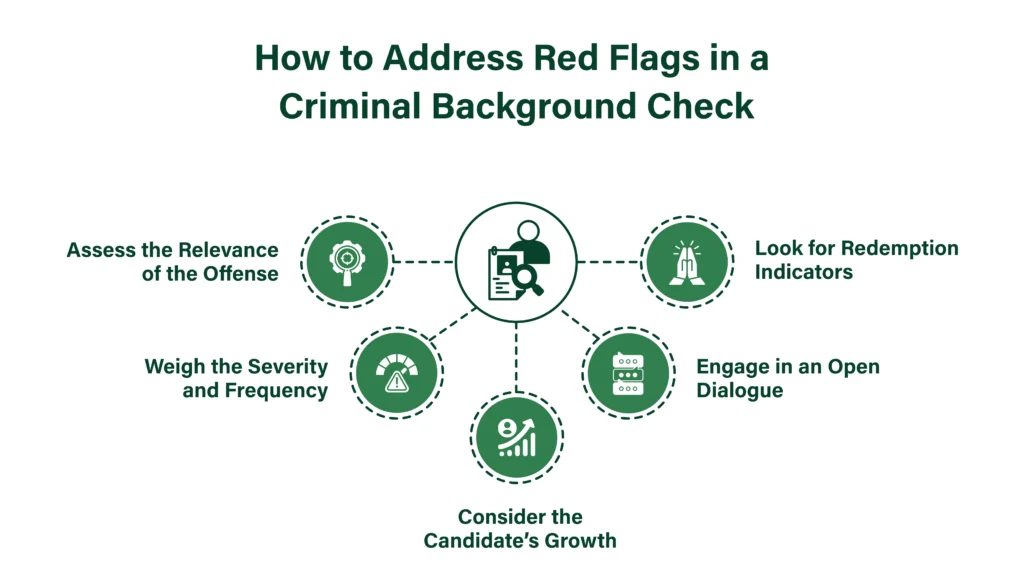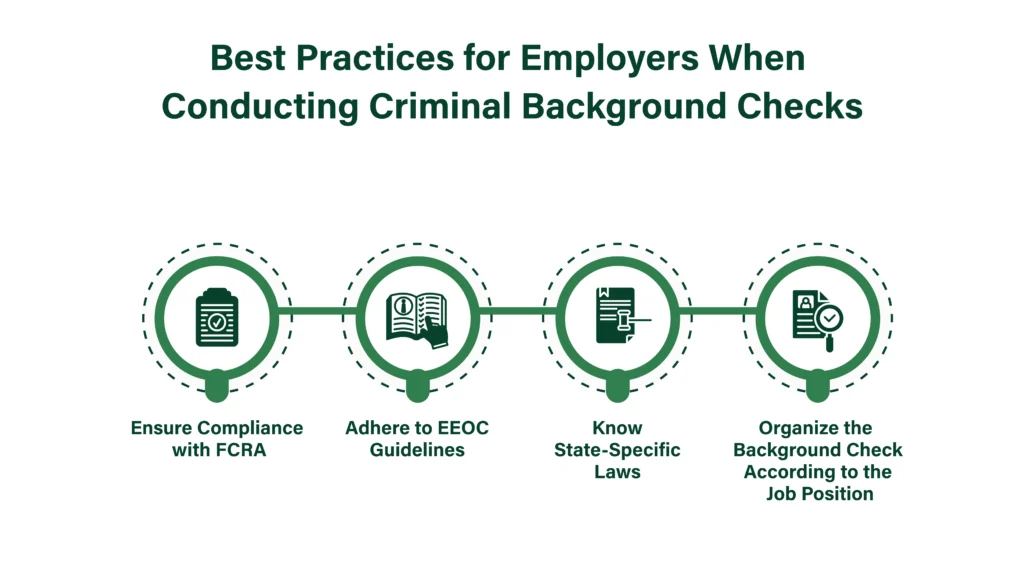According to a CareerBuilder survey, 75% of employers have discovered false resume information, making background checks more important than ever.
Criminal background checks go beyond just verifying work history. They provide a deeper look into a candidate’s past, allowing you to make smarter, safer hiring decisions and avoid costly mistakes.
With over 77 million Americans having a criminal record, knowing what shows up in a criminal background check is essential to assessing potential risks and ensuring the best fit for your company.
But what shows up in a criminal background check? What kind of information can you expect to find, and how do you identify potential red flags that could affect your hiring decision?
What Information Can a Criminal Background Check Reveal?

A criminal background check reveals a range of information about a candidate’s past. The exact details depend on the type of check, the employer’s needs, and the specific role being applied for. Here’s what typically appears in a criminal background check:
1. Identity and Social Security Verification
Background checks often use extensive databases, including Department of Homeland Security and Social Security Administration records, to ensure a candidate’s identity. The verification process verifies the validity of the Social Security number, ensures it matches the individual claiming it, and checks the history of its usage to detect any inconsistencies or fraudulent activities.
Additionally, online identity checks can verify an applicant’s address, allowing employers to cross-reference it with the information provided in the application to identify any discrepancies.
2. Felonies
Felonies represent the most severe criminal offenses and typically can result in significant prison terms. Common felonies include:
- Assault: This violent crime is particularly concerning for positions in security or any role requiring public interaction, as it raises serious red flags about a candidate’s behavior.
- Theft or Fraud: These critical offenses often disqualify individuals from roles in finance, retail, or any position demanding high trust.
- Drug Trafficking: This is especially pertinent for industries that enforce strict drug policies or in roles that are safety-sensitive, given the severe implications of such crimes.
Due to their serious nature, felonies usually attract a heightened level of scrutiny in relation to the specific responsibilities of the job being applied for.
3. Misdemeanors
Misdemeanors are less severe than felonies but can still be significant when assessing a candidate’s suitability for employment. These offenses usually result in shorter prison terms or fines and could be viewed as red flags depending on the crime’s nature. Notable examples include:
- Public Intoxication: Concerning for roles that require interaction with clients, as it questions the candidate’s professionalism and judgment.
- Minor Theft or Shoplifting: Particularly relevant for positions involving the handling of money or valuable goods, indicating potential trust issues.
- Disorderly Conduct: A serious consideration for jobs requiring a high level of professionalism or emotional stability.
During the hiring process, employers need to consider the severity of the misdemeanor and its direct relevance to the job requirements.
4. Arrests
According to FCRA, background checks will reveal arrests that have led to convictions. However, the arrests that did not lead to convictions are generally not reportable after seven years. Employers should be cautious and aware of state laws that may impose stricter limitations on using such records.
5. Outstanding Warrants
An outstanding warrant indicates that a candidate has unresolved legal matters. This situation is a considerable concern, particularly if the warrant relates to serious offenses or could disrupt the candidate’s work performance. Employers must carefully evaluate the implications of such warrants on the candidate’s suitability for the role, ensuring that hiring decisions are made with a comprehensive understanding of the potential risks involved.
6. Pending Charges
Pending charges do not guarantee a future conviction; however, they can influence an employer’s hiring decisions. Employers should carefully consider the severity of the charge, its pertinence to the job in question, and the probability of it leading to a conviction. This assessment helps ensure that hiring practices are fair and informed, aligning with the specific requirements and risks associated with the role.
7. Expunged or Sealed Convictions
A candidate’s criminal record may contain expunged or sealed convictions. Although not always visible in standard criminal background checks, these convictions may appear in more in-depth searches. Employers must familiarize themselves with and adhere to legal guidelines concerning the consideration of expunged or sealed convictions to ensure compliance with regulations and fairness in hiring practices.
8. Sex Offender Registry
For positions that involve contact with vulnerable populations such as children or the elderly, criminal background checks include searches of the sex offender registry. This information is essential for employers in sectors like education and healthcare, where safety and trust are paramount. If a candidate appears on the sex offender registry, it necessitates rigorous evaluation and may disqualify them from the role, given the potential risks. In these cases, employers must exercise thorough due diligence to ensure safety and protect those under their care.
How to Address Red Flags in a Criminal Background Check?

Discovering red flags in a candidate’s criminal background check can be concerning, but they don’t automatically disqualify someone from the role. It’s crucial to approach these findings thoughtfully and take steps to make a well-rounded decision.
Here’s how employers can handle red flags with a balanced perspective:
Assess the Relevance of the Offense
Not every crime has the same impact on every position. Tailor your evaluation to the specific job requirements. For example, a DUI may be a severe concern for a delivery driver but less for a software engineer working remotely. Always consider the connection between the offense and the role’s responsibilities.
Weigh the Severity and Frequency
There’s a big difference between a single, minor misdemeanor and a repeated offense pattern. Consider the severity of the crime and whether it points to a more significant issue. Is this an isolated incident, or does it indicate a habit that could risk your organization?
Consider the Candidate’s Growth
Time doesn’t erase a criminal record but provides growth opportunities. Has the candidate demonstrated personal and professional improvement since the offense? Look for maturity, stability, and accountability signs in their post-conviction actions.
Engage in an Open Dialogue
Give the candidate a chance to explain their story. Sometimes, the context behind a conviction or arrest can make all the difference in how it should be viewed. Listening to their explanation can provide insight into their character and help you decide.
Look for Redemption Indicators
Actions speak louder than records. If a candidate has taken steps toward rehabilitation—such as completing a treatment program, volunteering, or earning certifications—it could indicate they’re on a path of self-improvement and may be worth a second chance.
By evaluating each red flag with these considerations, you can make informed, fair, and balanced hiring decisions that protect your organization without unnecessarily dismissing good talent.
How Should Companies Handle the Situation in Case of Adverse Action?
If an employer decides that they don’t want to go ahead with an individual after reviewing the background check, they must follow a two-step process according to FCRA:
- Pre-Adverse Action: Before taking any adverse action, the employer must provide the applicant with a copy of the consumer report and a summary of their rights under the FCRA. This allows the individual to review the information and dispute any inaccuracies.
- Adverse Action: If the employer decides to proceed with the adverse action after giving the applicant time to respond, it must provide a notice with the name, address, and phone number of the consumer reporting agency that provided the report. It must also provide a statement clarifying that the agency did not make the decision and cannot explain the reasons for it. The statement should include information on the individual’s right to dispute the accuracy or completeness of the information.
Best Practices for Employers When Conducting Criminal Background Checks

It’s essential to follow these best practices to ensure you get the most out of your criminal background checks and avoid legal pitfalls:
Ensure Compliance with FCRA
The Fair Credit Reporting Act (FCRA) requires you to inform candidates that a background check will be conducted and to obtain their written consent. Employers must provide a clear and conspicuous disclosure in a document consisting solely of the disclosure, informing the individual that a consumer report may be obtained for employment purposes. Employers can only proceed with the background check if the individual provides written authorization.
This protects the candidate’s rights and helps maintain transparency in your hiring process. If adverse action is taken based on the findings, you must provide the candidate with a copy of the report and inform them of their rights to dispute inaccuracies.
The FCRA also requires employers to use reasonable methods to ensure the information reported is as accurate as possible. Simply relying on outdated or incomplete databases without checking with primary sources could lead to non-compliance.
Adhere to EEOC Guidelines
The Equal Employment Opportunity Commission (EEOC) has established guidelines to prevent discrimination in the hiring process. Ensuring that your background check process is applied consistently across all candidates and does not disproportionately disqualify individuals from protected groups is crucial. This helps create a fair hiring environment and reduces the risk of discrimination claims.
Know State-Specific Laws
Each state has specific laws regarding background checks, and employers must be familiar with these to ensure compliance. Some states, for instance, enforce “ban-the-box” laws, which restrict employers from inquiring about criminal history on initial job applications.
Generally, these laws delay criminal history questions until later in the hiring process, restrict the types of offenses considered (e.g., limiting older or non-conviction records), and may require an individualized assessment. This approach allows candidates to be evaluated on their qualifications first and aims to reduce discrimination while helping employers make informed decisions.
“Ban-the-box” and similar state-specific laws impact hiring by controlling employers’ use of criminal records.
Organize the Background Check According to the Job Position
Customize your screening process based on the risks and responsibilities of your hiring position. For example, a more comprehensive background check may be necessary for financial oversight roles, while entry-level positions with minimal access to sensitive information may require less scrutiny.
When Should You Disqualify a Candidate Based on a Criminal Record?
Deciding when to disqualify candidates based on their criminal background is a delicate process. Here’s how to approach it:
- Job-Related Offenses: Disqualification may be warranted if the offense is directly related to the role’s duties—e.g., a theft conviction for a cashier position.
- Recent or Severe Crimes: A recent felony or violent crime may pose an immediate risk to the workplace and warrant disqualification.
- Pattern of Behavior: Multiple convictions or a demonstrated pattern of criminal behavior can raise concerns about reliability and safety.
- Lack of Rehabilitation: If there is no evidence that the candidate has made efforts to rehabilitate, such as completing probation or attending counseling, it may indicate a lack of personal growth.
Make Informed Hiring Decisions with Verification Screening Solutions

Understanding the complexities of criminal background checks is crucial for making informed hiring decisions that safeguard your organization.
At Verification Screening Solutions, we specialize in providing comprehensive background screening services tailored to your unique needs. Whether you’re looking for criminal record searches, employment verification, or customized screening solutions, our team is dedicated to helping you streamline your hiring process and ensure compliance with all relevant laws.
Our Services Include:
- County-Level Criminal Search
- Statewide Criminal Search
- Federal Criminal Search
- Multi-State Criminal Search
- Motor Vehicle Report (MVR)
- Sex Offender Search
- Federal Civil Search
- County-Level Civil Search
- SSN Trace
- Employment Verification
- Education Verification
- Fingerprinting
Contact us today to learn how our outstanding verification solutions can help you make the best hiring decisions for your team.

